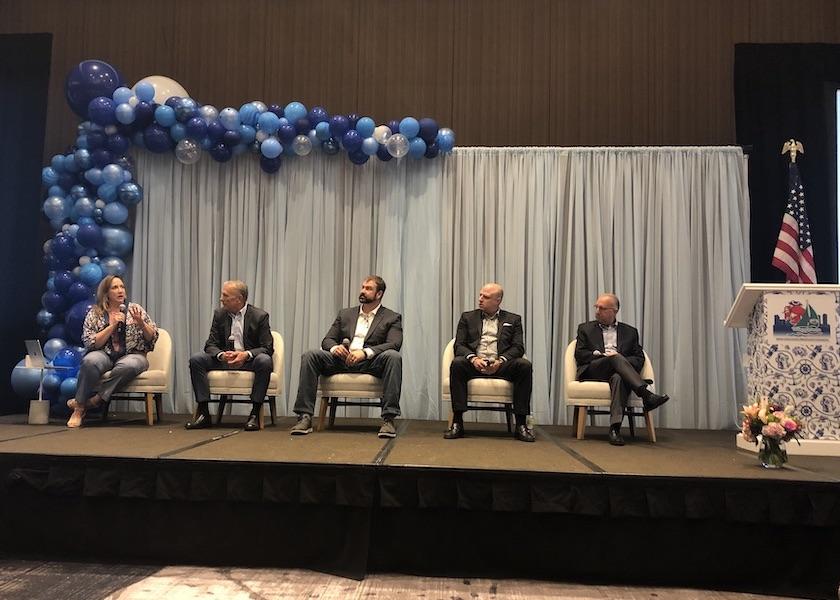Supply chain answers lie in technology, NEPC panelists say

To deal with supply chain issues, customers are asking for end-to-end visibility and contingency plans, says Joshua Noonan, director of delivered sales at C.H. Robinson’s Robinson Fresh division, based in Eden Prairie, Minn. Robinson Fresh specializes in sourcing and transporting fresh produce for consumers around the world, with C.H. Robinson at its logistics platform.
“Visibility is the No. 1 ask of the CEOs we deal with. We, as consumers, want as much communication as ever before, but with shortage of labor, we have to go down the digital route to provide that,” Noonan said at the New England Produce Council’s Produce, Floral and Foodservice Expo breakfast Aug. 25, in Boston.
Noonan answered questions on the education session topic, “How to Minimize Your Produce Supply Chain Challenges,” with three other panelists and moderator Rebeckah Freeman Adcock, vice president of U.S. government relations at International Fresh Produce Association.
Related news: Make it convenient: NEPC gets it done in a day
Everyone is already too familiar with labor shortages and higher operations costs. You can raise prices of the final product only so much before the consumer will just do without it, she said.
“Bottom line is that there are just not enough people to do the jobs we need done, and there are a thousand reasons for that, and it’s not going to get better anytime soon,” Adcock said. “We’ve got to roll up our sleeves and stop blaming each other. As my old boss used to say: I’m not interested in the problem; I’m interested in the solution.”
Most answers lie in digital technology, in which C.H. Robinson has been heavily investing, Noonan said. Today, one in three loads is booked digitally by the carrier, and one and a half years ago, zero loads were booked that way.
Automation is a big part of the solution, said panelist Mark Donley, vice president of ADUSA Procurement, a transportation, logistics, supply chain and storage company of Ahold Delhaize USA. Ahold is the parent company for more than 2,000 retail stores on the East Coast, including Food Lion, Giant Food, The Giant Co., Hannaford and Stop & Shop.
In the last three years, ADUSA Procurement has been retrofitting its warehouses to be more automated, and Donley said the company is proposing more retrofit automation.
“It’s actually helped us get product to the consumer. This is a space that we’ll see forever, and we’ll see additional investment over the years. It’s really addressing labor and quality,” Donley said. “Your costs still remain the same because you have a different source of labor, engineers of the software, people cleaning the belts.”
But warehouses will need, say, about 40 people compared to 300 people, and the excess people can cover labor shortages inside stores.
Dave Patnaude, sales manager at Coast to Coast Produce, a grower, shipper and distributor based in Cheshire, Conn., said he expects more robotics in farming, including harvesting.
Related: NEPC Expo Reception Photos
These solutions need to factor in the consumer demands of Generation Z, the oldest of which are 25 now. They’re digital natives concerned with sustainability — forecasted to have more spending money than millennials and Generation X.
Noonan predicts that railway transportation, historically a “back-back-backup plan,” will become more desirable because it uses a quarter of the fuel that a semi truck does. “That’s important to the next generation of buyers,” he said.
Distribution has to change, such as moving your warehousing closer to the consumer.
Noonan emphasized the common solution all the panelists touched on: “Technology, technology, technology,” he said.
“A few years from now, all transactions will be on apps. Ten-plus years from now, it will only be faster. Venture capitalists have poured billions and billions of dollars into this industry,” he said, mentioning big tech companies such as Google and Meta, the latter of which owns Instagram and Facebook.
“We have to become more tech-savvy, more efficient, because it’s coming.”







